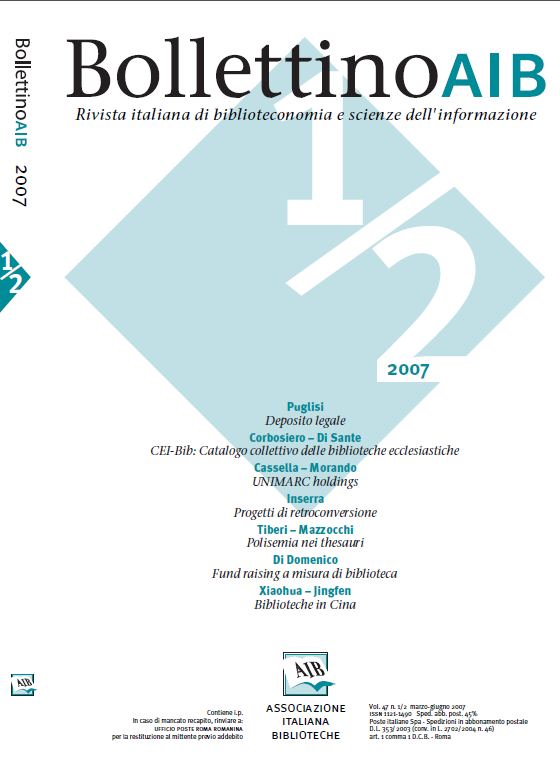Fund raising on a library scale
Main Article Content
Abstract
In a previous article I tried to define some elements that might describe an effective approach to fund raising for libraries, that is to say a specific model for the finding and systematic collection of additional funds (or other resources) for the continuing support of the institutional aims, the activities, projects and development of a library organization.
The article aimed at listing the communication aspects of fund raising, that are especially fundamental in the case of a sector, such as that of libraries, that is structurally weak and not very visible.
This time I will rather try to deal with the choice of markets, sources, and chances that may concretely be offered to libraries seeking funders or, at least, supporters.
As can perhaps be deduced from an attempted brief reconstruction, the market opportunities for fund raising that could be at library level appear to be quite varied and of unequal desirability, but all worthy of attention. It is not the easy short-cuts, but time, concrete results, moments of formation and learning, and finally a widespread and shared organizational experience that will dictate towards what destinations it would be desirable to address one's efforts. One fact is however certain: in a season that is lacking in public and institutional resources but that has an objective need to develop and update libraries (I mean accessibility, quality, renewal, enlargement), their documentary offer and their services, it is no longer possible to postpone the appointment with these problems. A systematic search for resources, together with strategies and policies aimed at nourishing and satisfying the demand for library services, has every right to join the cultures, methods and practices called to sustain a library project (this is always the obligatory point of departure) and the organizational action, never only strictly referring to librarianship, that is implied. The objection that the decisional levels involved are often outside the library structures is invalid: fund raising is mainly communication and planning: nothing prevents consulting the institutional interlocutors concerning the object and contents of an operational programme and establishing with them how, where and with which partners it is possible to find assistance and investments for today's libraries and those of tomorrow.
The article aimed at listing the communication aspects of fund raising, that are especially fundamental in the case of a sector, such as that of libraries, that is structurally weak and not very visible.
This time I will rather try to deal with the choice of markets, sources, and chances that may concretely be offered to libraries seeking funders or, at least, supporters.
As can perhaps be deduced from an attempted brief reconstruction, the market opportunities for fund raising that could be at library level appear to be quite varied and of unequal desirability, but all worthy of attention. It is not the easy short-cuts, but time, concrete results, moments of formation and learning, and finally a widespread and shared organizational experience that will dictate towards what destinations it would be desirable to address one's efforts. One fact is however certain: in a season that is lacking in public and institutional resources but that has an objective need to develop and update libraries (I mean accessibility, quality, renewal, enlargement), their documentary offer and their services, it is no longer possible to postpone the appointment with these problems. A systematic search for resources, together with strategies and policies aimed at nourishing and satisfying the demand for library services, has every right to join the cultures, methods and practices called to sustain a library project (this is always the obligatory point of departure) and the organizational action, never only strictly referring to librarianship, that is implied. The objection that the decisional levels involved are often outside the library structures is invalid: fund raising is mainly communication and planning: nothing prevents consulting the institutional interlocutors concerning the object and contents of an operational programme and establishing with them how, where and with which partners it is possible to find assistance and investments for today's libraries and those of tomorrow.
Article Details
Section
Articles

This work is licensed under a Creative Commons Attribution-ShareAlike 4.0 International License.
